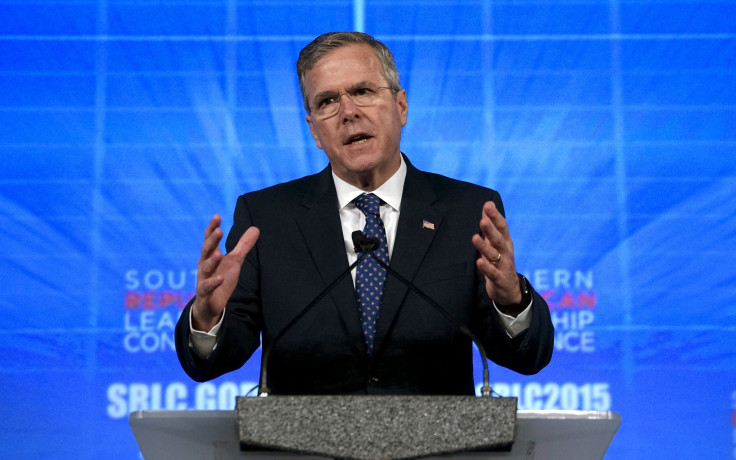Election 2016: Jeb Bush Super PAC Prompts Investigation Calls From Watchdog Groups

WASHINGTON -- Two watchdog groups are asking the Department of Justice to investigate whether likely 2016 presidential candidate Jeb Bush is violating campaign finance laws by raising millions of dollars for his super PAC. The Republican has been aggressively raising funds for his Right To Rise PAC, which is expected to use the funds to pay for most of the functions campaigns have traditionally supported, like television ads and regional staff.
“It is hard to conclude that laws are not being broken when you look at Jeb Bush’s actions as an ‘undeclared’ candidate and the laws on the books,” Campaign Legal Center Executive Director J. Gerald Hebert said in a statement. “Quite clearly this is a man very actively running for president and raising tens of millions of dollars in ‘soft money’ to aid his quest. Denying he is a candidate does not exempt the former governor from obeying the law, which prohibits candidates from raising and spending soft money.”
Officials with Bush's political action committee insisted they are abiding by the letter of the law. "We are fully complying with the law in all activities Governor Bush is engaging in on the political front, and will continue to do so," spokeswoman Allie Brandenburger said in a statement.
Bush, and several other candidates running in 2016, have worked to raise money for their super PACs before launching their campaigns. Super PACs can take unlimited sums of money from donors, while a campaign is subject to caps on individual donations. Once they are official candidates with established campaigns, they will be prohibited from coordinating with the PAC. But they argue that before announcing, it remains legal for them to raise funds for the PAC.
This election cycle is the first in which candidates have fully embraced the use of super PACs, which were legalized in 2010 by the Supreme Court’s Citizen’s United decision. Bush has been on the forefront of working to raise funds for the PAC in apparent anticipation of an announcement, setting a potential $100 million fundraising goal. Bush isn’t expected to announce his bid until next month, a decision that will come more than five months after he created Right To Rise and began raising funds for the PAC.
But critics and watchdog groups -- like the two complainants, Democracy 21 and the Campaign Legal Center -- say by participating in fundraising efforts, Bush and the other candidates are meeting the definition of a candidate, as far as the campaign finance law is concerned. In their letter to the Justice Department, the complainants say Bush has raised and spent more than $5,000 in the effort to win the nomination, a definition the law uses to describe a candidate. They called on the Justice Department to appoint a special investigator, a request that was likely aimed at trying to avoid the political implications of having the Democratic administration investigate a Republican candidate.
Democracy 21 and the Campaign Legal Center also had harsh words for the Federal Elections Commission. Previous complaints by the two groups about alleged campaign finance law violations by Democrat Martin O’Malley, governor of Maryland, and Republicans Scott Walker, governor of Indiana, and Rick Santorum, a former U.S. senator from Pennsylvania, have produced few changes from the FEC, the groups say.
“The Justice Department has the authority and the responsibility to prevent the 2016 presidential candidates from engaging in the most massive violations of the campaign finance laws in the nation’s history,” said Fred Wertheimer, president of Democracy 21. "The Justice Department needs to act to protect the integrity of the presidency and our democracy.”
© Copyright IBTimes 2024. All rights reserved.












